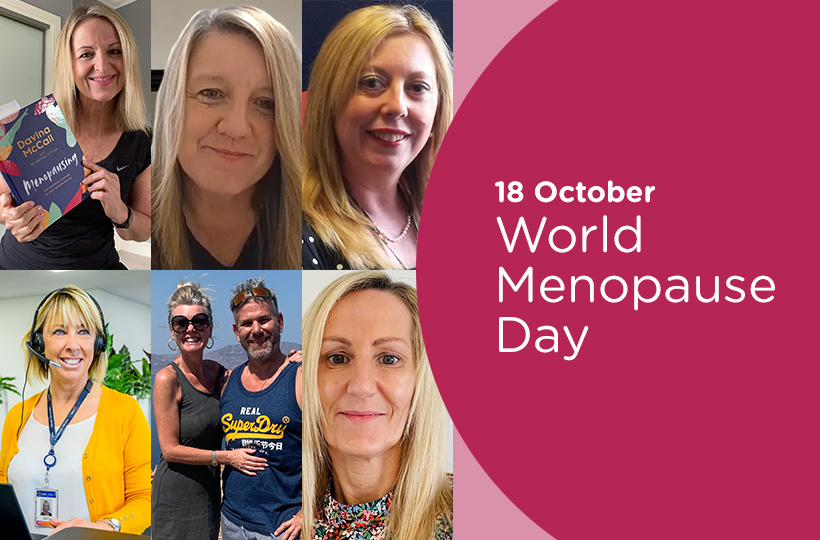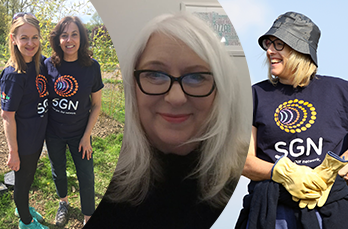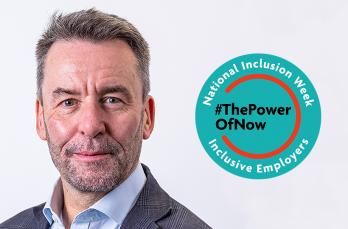
Clockwise from top left: Kirsty Richardson, Tracey McIntyre, Glenda Locke, Linda Spence, Matt Dongworth and his wife, and Margaret Hamilton
In celebration of this year’s World Menopause Day, our people have been sharing their stories of how menopause has affected them, their advice for others and encouraging one another to unite in support.
For Kirsty Richardson, our Head of Employee Experience, she was pleased to hear colleagues sharing their stories for last year’s World Menopause Day but was disappointed that we didn’t do more – in her words: we started the conversation but that’s all we did.
Kirsty said: “This year is going to be different. I promise to make change happen, along with the support of some of our colleagues.”
“The menopause community is growing, thanks to people like Davina McCall passionately raising awareness. And we can do so much more in SGN, but we need to make it comfortable for people, both men and women, to talk about. We need a supportive environment for anyone affected, and line managers could do with some help to learn how to manage it well.”
With this in mind, she’s asking what can we do to make our workplace menopause friendly and is keen to start a menopause network – for both men and women – where we can share experiences and support one another.
Following a conversation with Tracey McIntyre, our Head of Construction, about how HRT helped her get back to being “the real me”, Kirsty returned to her GP to alter her treatment.
Tracey says: “Eight months ago, I looked in the mirror early one Tuesday morning and no longer recognised the person I was seeing. I looked the same, I sounded the same – but I was not the same. The person I thought I was – was no longer there.”
Tracey says she was aware and understood the physical changes she was going through: “Hot flushes like I was on fire, brain fog (increasingly concerned that I had something seriously wrong), constantly exhausted, night sweats, mood changes, weight gain and the worst sleep pattern ever. I couldn’t get to sleep, couldn’t stay asleep and always felt tired.”
She was concerned about taking HRT but once she had the facts, she discussed treatment options with her GP and now takes three medications: an Oestrogen patch, Progestogen pill and Testosterone gel.
Within a month, most of Tracey’s physical symptoms had gone. Within three months “my life had changed, I had changed, I was me again. I had my mojo back.”
While Tracey’s experience with her GP was a positive one, the same can’t be said for all of our female colleagues.
For Glenda Locke, Business Change Manager, she found it really hard not knowing what was happening to her body or how to deal with it.
Glenda says: “When I went to the doctors, they sent me away saying my mum was 50 when she went through it so I was too young. It was only after numerous appointments over the next three years that they eventually tested me and apologised as I was fully menopausal.”
“I tried various homoeopathic remedies and pills from the doctors and the one thing that stopped the mood swings and flushing was HRT. It was in tablet form at first but now I use the patches – others can make recommendations but everyone is different and you have to go with what suits you.”
It’s advice shared by Margaret Hamilton, Stakeholder and Community Manager, who had watched older friends going through the menopause and really struggle with it, refusing to use medications and saw it affect their whole lives.
Margaret says: “The day I woke up and thought I was going through the menopause, I was right in there. I knew what I wanted and I had done my research. I couldn’t quote you everything there is to know about the menopause and HRT, but I’d researched the areas I wanted to know about and I went to my doctor with the mindset that I was coming out with help.”
“But I had to fight for that. I literally had ten minutes with my doctor. Ten minutes and we talked about it backwards and forwards and at the end, she said that’s your ten minutes up. And I told her I wasn’t walking out of there without a prescription for HRT. And I got it.”
“My biggest message is: know what you want. Do your research and fight. Fight for what you need.”
Senior Project Manager Matt Dongworth also shared his perspective on his wife’s experiences and how the menopause crept up and ended up testing the strength of their marriage.
Matt says: “I neglected my wife’s condition and therefore I neglected her. I told her this and it was like opening a floodgate of relief. That was all she needed to hear.”
“My mental health first aid training taught me to observe, listen and be empathetic to conditions outside of my own experience. It rang alarm bells when I realised a great deal of mental illness characteristics matched those that my wife was experiencing through the menopause. At this point, I knew I had to do something about it and step in as a support mechanism, rather than running away from it.”
Matt and his wife worked together on a combined approach to finding solutions and worked out coping mechanisms for when triggers came up.
It’s hoped stories like these will raise greater awareness of the need for supporting menopausal colleagues and our people living with someone going through the menopause.




